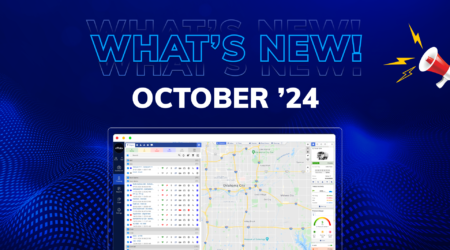Improve Logistics with Transport Fleet Management Systems
In the fast-paced world of logistics, efficiency and precision are paramount. This is where Transport Fleet Management Systems (TFMS) come into play, revolutionizing how businesses handle their transportation needs. A Transport Fleet Management System is a technology-driven approach designed to streamline the process of managing a fleet of vehicles, ensuring they are used most efficiently and effectively.
Types of Transport Fleet Management Systems
Transport Fleet Management Systems come in various forms, each tailored to meet specific needs. The most common types include:
Vehicle Tracking Systems: These systems use GPS technology to monitor the location and movement of each vehicle in real time.
Route Optimization Systems: They analyze various routes and choose the most efficient one, saving time and fuel.
Maintenance Management Systems: These systems keep track of vehicle maintenance needs, ensuring timely servicing and reducing breakdowns.
Fuel Management Systems: They monitor and manage fuel usage and expenses, aiding in cost reduction.
How Do Transport Fleet Management Systems Work?
At their core, Transport Fleet Management Systems rely on a combination of GPS tracking, data analysis, and digital communication. They gather real-time data from each vehicle, including location, speed, fuel consumption, and engine performance. This data is then analyzed to provide insights into optimizing routes, maintenance schedules, and overall fleet performance.
Benefits of Transport Fleet Management Systems
Enhanced Efficiency: By optimizing routes and schedules, TFMS reduce travel times and idle periods.
Real-Time Vehicle Tracking and Monitoring
One of the most significant benefits of TFMS is the ability to track and monitor vehicles in real-time. This feature provides fleet managers with instant access to the location, direction, and speed of each vehicle. Such monitoring ensures timely deliveries and helps in quick decision-making in case of unexpected events like traffic delays or vehicle breakdowns.
Improved Route Planning and Optimization
Efficient route planning is critical in transport logistics. TFMS excel in optimizing routes by analyzing various factors like distance, traffic conditions, and delivery schedules. This optimization not only saves time but also reduces fuel consumption and wear and tear on vehicles, leading to considerable cost savings.
Enhanced Driver Safety and Performance
TFMS contributes significantly to driver safety by monitoring driving patterns and behaviors. These systems can alert fleet managers to any unsafe practices like speeding or harsh braking. Moreover, they facilitate training and feedback for drivers, leading to improved performance and reduced accident risks.
Streamlined Fuel Management
Managing fuel consumption is a key aspect of fleet management. TFMS helps in tracking and analyzing fuel usage, identifying areas where fuel efficiency can be improved. This monitoring leads to reduced fuel costs, which is a substantial benefit given that fuel is one of the most significant expenses in transportation.
Effective Maintenance and Vehicle Health Monitoring
Timely maintenance is crucial for the longevity and efficiency of vehicles. TFMS assist in scheduling regular maintenance checks and alert managers about potential vehicle issues before they become serious problems. This proactive approach reduces downtime and extends the lifespan of the fleet.
Compliance and Reporting
Regulatory compliance is a major concern in the transportation sector. TFMS aid in maintaining accurate logs of driver hours, vehicle usage, and maintenance records, ensuring compliance with industry regulations. These systems also provide detailed reports that can be used for audits, budgeting, and planning purposes.
Enhanced Customer Satisfaction
Ultimately, the use of TFMS leads to improved customer satisfaction. With more efficient operations, businesses can ensure timely deliveries, provide accurate delivery estimates, and quickly respond to customer queries about shipment statuses. Happy customers translate to repeat business and positive word-of-mouth.
Assessing Your Fleet’s Needs
Before diving into the options, it’s crucial to assess your fleet’s specific needs. Consider the size of your fleet, the type of vehicles, and the nature of your operations. Do you require advanced GPS tracking, or is fuel management your primary concern? Understanding these needs will guide you in selecting a system that aligns perfectly with your fleet’s requirements.
Key Features to Look For
Real-Time Tracking and Reporting
A good fleet management system should offer real-time tracking. This feature allows you to monitor vehicle locations, routes, and statuses, ensuring timely deliveries and operational efficiency.
Maintenance and Vehicle Health Monitoring
Regular maintenance is key to fleet longevity. Look for systems that offer maintenance scheduling and alerts. These features help prevent breakdowns and reduce repair costs.
Fuel Management
Fuel costs significantly impact your bottom line. Systems with fuel tracking and management features can identify inefficient fuel usage and suggest improvements.
Driver Management and Safety
Driver behavior greatly influences fleet performance. Systems that monitor driver behavior and provide safety features can reduce accidents and improve driving standards.
Ease of Integration
The system should easily integrate with your existing software and hardware, ensuring a seamless transition and minimizing disruptions to your operations.
User-Friendly Interface
A system with a user-friendly interface ensures that your staff can quickly adapt to and efficiently use the software.
Cost Considerations
While it’s tempting to opt for a system with the lowest upfront cost, consider the long-term value. A more expensive system might offer features that save money in the long run. Additionally, check if the vendor charges for updates or support, as these can add to the overall cost.
Vendor Reputation and Support
Choose a vendor with a strong reputation and a track record of providing quality support. Good vendor support can make a significant difference, especially during the initial stages of implementation.
Scalability
As your business grows, so will your fleet management needs. Opt for a scalable system, allowing you to add more vehicles or functionalities as required.
Security
Given that fleet management systems handle sensitive data, security cannot be overlooked. Ensure the system has robust security measures to protect your data from unauthorized access.
Challenges and Considerations
While the benefits are numerous, there are challenges to consider:
Cost of Implementation: The initial setup and maintenance of TFMS can be expensive.
Data Security: With the reliance on digital data, ensuring its security is crucial.
Training and Adaptation: Employees need training to adapt to these new systems effectively.
Conclusion:
In conclusion, Transport Fleet Management Systems are essential tools in the modern logistics and transportation industry. They offer numerous benefits, including increased efficiency, cost savings, and improved safety. As technology advances, these systems will undoubtedly become even more integral to fleet management, driving the industry toward a more efficient and sustainable future.





